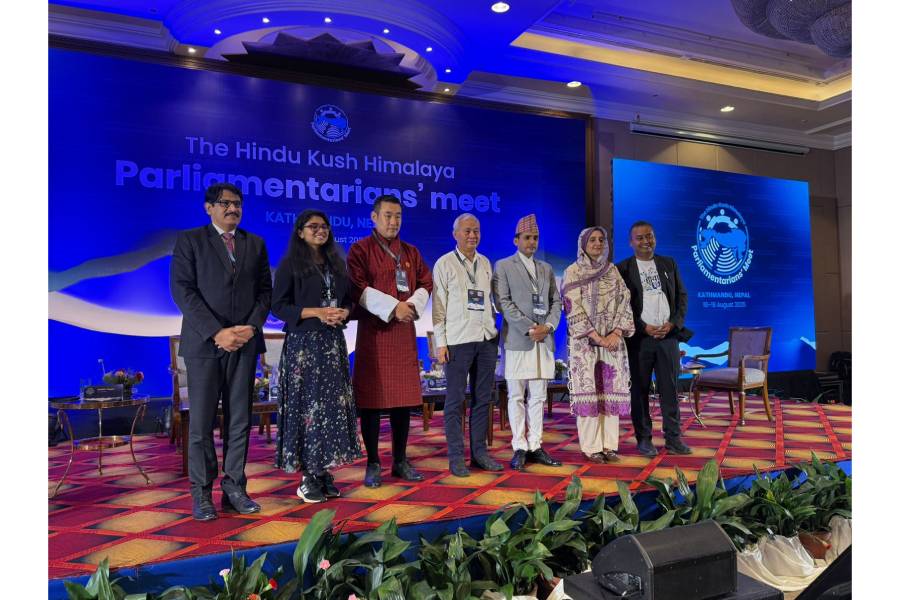Regional taskforce on air quality crucial for future generations: Supradip Chakma


Highlighting the importance of clean air and the severe impacts of air pollution, Chattogram Hill Tracts (CHT) Affairs Adviser Supradip Chakma on Tuesday said establishing a regional parliamentary taskforce on air quality is essential to address related challenges.
“Parliamentarians must lead this, because it is their responsibility. Such a taskforce could also address climate change alongside air quality. Let us therefore support the development of a regional air quality framework,” he said while chairing a high-level panel discussion on the sidelines of the Hindu Kush Himalaya Parliamentarians Meet-2025.
The Adviser expressed the hope that this initiative would demonstrate, in the future, that they are on the right path, reports UNB.
He also underscored the importance of promoting equitable energy transition policies across the countries of the Hindu Kush Himalaya region.
“As many of you have said, we must strengthen regional data systems and public accountability,” he added.
Supradip emphasised the need respecting and protecting nature’s blessings.
“Since our behavior has its consequences, perhaps we can say that if we can fix our DNA, then we can also fix the DNA of nature,” he said.
Senior Joint Member Secretary of National Citizen Party Dr Tasnim Jara, Chairperson of the Public Accounts Committee, Bhutan Sonam Tashi, Member of Parliament, Nepal Madhav Sapkota and Deputy Speaker and Chairperson of Special Committee on Gender Mainstreaming Suriya Bibi spoke as the panellists while Air Lead at ICIMOD Ashish Tiwari made a presentation before the panel discussion on “Striving Together for Clean Air and Blue Skies in the HKH region.
Speakers highlighted how air pollution threatens human health and ecosystems, stressing the urgency of joint action for cleaner air.
Exposure to polluted air can cause respiratory illnesses, cardiovascular diseases and even premature death.
In contrast, clean air supports lung health, reduces the risk of chronic conditions, and contributes to longer lives.
The CHT Affairs Adviser expressed his inspiration seeing young people taking the lead.
“Our young generation is showing the way. They are taking the burden of what needs to be done, whether in terms of air pollution, water pollution, or other pressing challenges,” he said.
“So, I request all of you, especially the young speakers we heard today: please decide, and please lead your nations forward.”
Supradip observed that people often neglect what comes free. “Air is free, we don’t take care of it. Water is free, we don’t take care of it. Sometimes people even treat truth as if it is free, and neglect it too. But at the end of the day, neglect leads to suffering. So think about it,” he mentioned.
He urged policymakers to recognise the need for change. “We cannot continue to live like this. It is difficult, yes, whether in Dhaka, Delhi, or Beijing—with such dense populations and pollution, we cannot save our air quality overnight. But what can we do now?”
Citing rural Bangladesh, Supradip said air quality is still better in those areas than in cities.
“For example, my hometown Chattogram has much better air quality than Dhaka. I always love going back home, because I can breathe freely. Those people still know how to live with nature. Urban competition and pressure force people to live differently,” he said.
The Adviser called on the younger generation to change their lifestyle patterns and behaviors, stressing that such changes would make a real difference.
Speaking about the hill areas of Bangladesh, the Adviser said, “I do not want mass tourism that destroys the environment. For example, backpackers who spend only Tk 500 but leave behind waste that costs Tk 1,000 to clean. I don’t want that kind of tourism. What I want is responsible development, responsible behavior, and respect for nature.”
He highlighted the government’s efforts and said the Environment Ministry is working seriously.
“For example, we banned plastic shopping bags. In government offices, you no longer see plastic bottled water, there are glass jugs and glasses instead,” he added.
However, he admitted that with a population of 170 million, eliminating harmful materials overnight is impossible. “But the government is introducing new rules, regulations, and awareness campaigns so people change their behavior and lifestyle patterns,” he said.
Supradip stressed that pollution is not only an environmental issue, it affects the economy, transport, and above all, public health.
Still, the Adviser said he was reassured by the younger generation’s willingness to understand rather than simply agree. “Solutions come from learning, from knowing more, and from accepting reality,” he said.
The Adviser also emphasised the importance of local adaptation solutions, pointing out that people in remote areas often have a stronger connection with nature and valuable lessons to share.
“We have to live, we have to survive, and we have to ensure good health. We must move forward together so that people can live long and fulfilling lives,” Supradip said.


 For all latest news, follow The Financial Express Google News channel.
For all latest news, follow The Financial Express Google News channel.